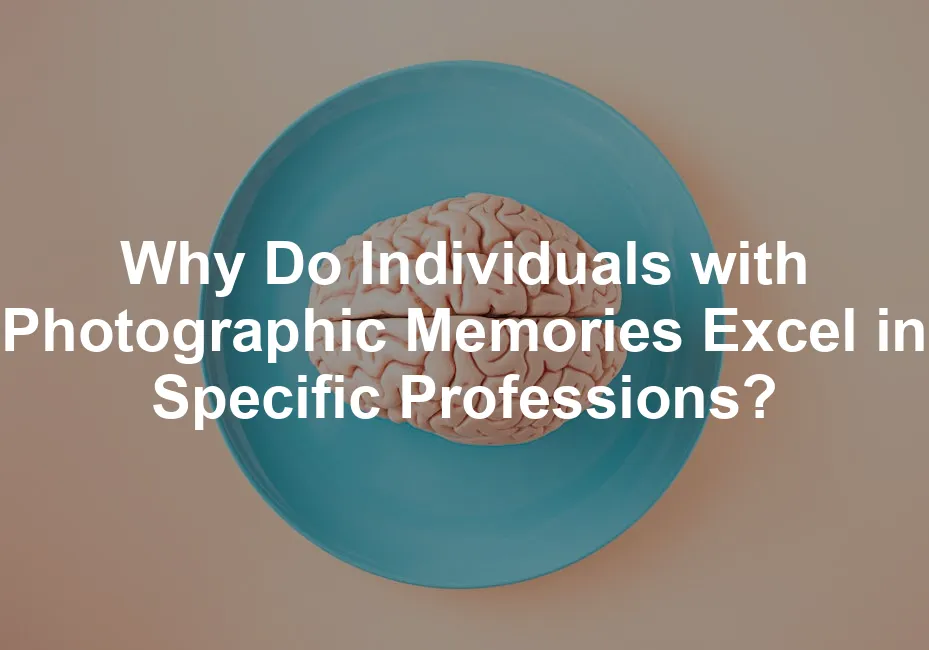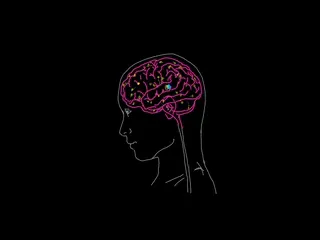
Why Do Individuals with Photographic Memories Excel in Specific Professions?
Introduction
Photographic memory, often called eidetic memory, is quite the fascinating phenomenon. It’s not just about remembering where you left your keys (though that’s a bonus). Individuals with this ability can recall images and information with a clarity that leaves others scratching their heads. But let’s clear the air: not everyone with this memory magic becomes the next Einstein or Shakespeare. While some soar in specific professions, others are just as likely to forget what they had for breakfast.
Imagine a lawyer who can quote case law verbatim or a musician who remembers every note of a complex symphony after hearing it just once. These talents are impressive! Still, the reality is that success relies on more than just a sharp memory. Factors like emotional intelligence and the ability to apply knowledge effectively play crucial roles. So, let’s unravel the delightful enigma of how photographic memory intersects with professional success, all while keeping a wink and a nod at the quirks of life.
If you’re looking to sharpen that memory of yours, consider diving into “Moonwalking with Einstein: The Art and Science of Remembering Everything” by Joshua Foer. This book is not just a read; it’s a journey into the world of memory techniques that could turn your brain into a high-performing machine.

The Science of Photographic Memory
Definition and Mechanism
Photographic memory refers to the capability to recall visual information in vivid detail after brief exposure. It’s often confused with eidetic memory—where one can visualize an image for a short time after seeing it. While photographic memory suggests a long-term recall ability, eidetic memory is more like a fleeting snapshot.
Neurologically, this exceptional talent may stem from unique brain structures and functions. Research indicates that individuals with photographic memory might have differences in the medial temporal lobe, which plays a pivotal role in memory storage. Studies also suggest that these individuals often engage in powerful mnemonic techniques, making it easier to retain vast amounts of information.
As intriguing as it sounds, the existence of true photographic memory remains a topic of debate. Some researchers argue that what we perceive as photographic memory is often a result of extensive training and practice, rather than an innate ability. Various theories attempt to explain this phenomenon, including the role of synesthesia—where stimulation of one sensory pathway leads to involuntary experiences in another. So, while the science is still evolving, the allure of photographic memory continues to capture our imagination!
If you’re curious to delve deeper into memory improvement, check out “The Memory Book” by Harry Lorayne and Jerry Lucas. This classic guide is packed with techniques to boost your memory in various aspects of life – work, school, and home.

Misconceptions and Realities
Photographic memory often dazzles those unfamiliar with it. Many believe it to be a superpower—like having a mental camera. But let’s set the record straight: it’s not all rainbows and unicorns.
One common myth is that individuals with photographic memory never forget anything. Spoiler alert: they do! Memory is fallible, and even photographic memory has its limits. They can misremember facts or overlook nuances just like the rest of us.
Another misconception is that photographic memory guarantees success. While it can provide an edge, it’s not the golden ticket. Success in any profession requires more than just an impressive memory. Skills like emotional intelligence, critical thinking, and effective communication are vital too.
Take a lawyer, for example. A strong memory helps them recall case law and statutes. However, without the ability to argue persuasively and connect with clients, their memory alone won’t win cases. Similarly, in creative fields, artists may rely on their visual recall, but creativity and technical skill are equally essential.
In short, while photographic memory is a fascinating ability, it doesn’t single-handedly dictate success. It’s merely one tool in a toolbox filled with various skills and attributes necessary for thriving in any profession.
If you’re interested in honing your memory with some creative techniques, consider “How to Develop a Perfect Memory” by Dominic O’Brien. This book offers practical strategies to enhance your memory skills and make you the go-to person for remembering all the important details!

Professions that Benefit from Photographic Memory
Law and Legal Professions
The legal realm is a prime playground for those with photographic memory. Imagine a lawyer who can recall case law and statutes with surgical precision. They don’t just memorize facts; they wield them like a sword in courtrooms.
Take the late Supreme Court Justice Ruth Bader Ginsburg. Known for her extraordinary memory, she could recall intricate legal precedents. This ability enabled her to craft compelling arguments and influence pivotal decisions. Lawyers in high-stakes cases often credit their success to their capacity to remember details that others might overlook.
Judges also benefit immensely. They need to sift through complex cases, recalling previous rulings and relevant laws. This skill helps them make informed decisions that can change lives.
Moreover, law students often find themselves at an advantage. Those with strong memory skills can absorb vast amounts of information, making exam preparation a breeze. They can recall details from long readings, which can be the difference between passing and failing in law school.

To get a deeper understanding of memory techniques, grab a copy of “A Mind for Numbers” by Barbara Oakley. This book offers insights into how you can excel in math and science through effective memory techniques.
Education and Academia
In the world of education, photographic memory can be a game changer. Teachers and professors who possess this ability can recall vast amounts of information, enhancing their teaching effectiveness.
Imagine a history professor who can recite dates, events, and the names of key figures without breaking a sweat. This capability allows them to create engaging lectures filled with rich details. Students benefit immensely from a teacher who brings history to life through vivid storytelling.
In research, photographic memory aids in retaining complex data and theories. Researchers can remember intricate details of previous studies, allowing them to build on existing knowledge without constantly referring back to notes. This can lead to groundbreaking discoveries that push fields forward.
Additionally, educators with exceptional memory can manage classrooms more efficiently. They remember students’ names, backgrounds, and learning styles, allowing for tailored teaching approaches. This creates a supportive environment where students feel valued and understood.

If you’re a student or educator looking to improve your memory skills, consider “Your Memory: How It Works and How to Improve It” by Kenneth L. Higbee. This book offers valuable insights into memory enhancement techniques tailored for students and professionals alike.
Creative Fields
Artists and Designers
In creative professions, like art and design, photographic memory is a significant asset. Artists often rely on their visual memory to create intricate and detailed representations.
Take the renowned painter Vincent van Gogh. His ability to recall colors, shapes, and scenes enabled him to create masterpieces that resonate with viewers. His works are not just paintings; they are vivid memories captured on canvas.
Designers also benefit from strong visual memories. They can recall design principles, color schemes, and spatial arrangements, allowing them to create visually stunning and cohesive projects. Whether designing a website or a piece of furniture, this skill helps them visualize the end product before even starting the work.
Furthermore, photographers with photographic memory can remember the perfect shot, framing, and lighting. This skill allows them to capture moments with precision, creating memorable images that tell compelling stories.

In conclusion, photographic memory is not just a quirky trait; it’s a powerful tool that enhances performance across various professions. Whether in law, education, or the arts, individuals with this ability often find themselves excelling in their chosen fields. But remember, it’s not just about memory; it’s about combining it with other essential skills to truly shine.
If you’re an artist looking to express your creativity, consider investing in a quality sketchbook for artists. It’s the perfect canvas for bringing your vivid memories to life!
Musicians and Performers
Musicians and performers thrive on memory. It’s their secret sauce! Imagine trying to play a complex symphony or sing a challenging opera without recalling notes or lyrics. Yikes! Memory is the lifeblood of music composition and performance.
Photographic memory shines here. Musicians with this ability can effortlessly recall intricate melodies and harmonies. They can play their favorite tunes after hearing them just once. Talk about musical genius! This remarkable recall allows them to focus on expression and creativity instead of getting lost in the notes.
Moreover, performers often have to memorize lengthy scripts or choreography. A photographic memory can be a game changer. Actors can recall lines, stage directions, and even the emotions behind their characters with stunning clarity. It’s like having a mental script that never fades! This skill boosts their confidence, allowing them to deliver captivating performances that leave audiences spellbound.

Healthcare Professions
In the healthcare field, memory is crucial. Doctors and surgeons rely on memorizing medical procedures and patient histories. Imagine a surgeon who can’t remember the steps of a critical operation. That’s a recipe for disaster!
Photographic memory plays a pivotal role here. Medical professionals with this ability can recall complex anatomical details and understand treatment protocols without hesitation. They can quickly access patient histories, medications, and allergies, ensuring they provide safe and effective care.
Consider Dr. Jane, a renowned cardiothoracic surgeon. She attributes her success to her extraordinary memory. Dr. Jane recalls every detail of her patients’ histories, which helps her make informed decisions during surgery. This ability can quite literally save lives!
Additionally, medical students who possess strong memory skills often excel. They can absorb vast amounts of information, making exam preparation less daunting. Instead of cramming, they simply recall what they’ve learned with precision. This edge can lead to top grades and successful careers in medicine.

To support your journey into the medical field, consider using brain training apps. These tools can help you sharpen your recall skills and prepare for those tough exams!
The Role of Emotional Intelligence and Other Skills
Beyond Memory: The Importance of Emotional Intelligence
Memory isn’t the only player in the success game; emotional intelligence (EI) is a key contender! Emotional intelligence complements memory by enhancing interpersonal skills. It’s not just about recalling facts; it’s about connecting with others.
For instance, a doctor may remember every detail of a medical procedure, but if they lack empathy, they might struggle to connect with patients. A healthcare professional who can recall a patient’s name, along with their concerns and emotions, creates a comforting atmosphere. This connection fosters trust and improves patient outcomes.
Successful leaders often demonstrate high levels of emotional intelligence. They can read the room, understand team dynamics, and inspire their colleagues. When paired with strong memory skills, EI amplifies professional capabilities, leading to remarkable achievements.

Motivation and Work Ethic
Now, let’s chat about motivation and work ethic. These qualities are essential for career achievement, whether you have photographic memory or not. Personal drive, discipline, and perseverance are the fuel that propels individuals forward.
Consider the story of Mark, a budding musician. Despite struggling with anxiety, he practiced relentlessly. His dedication paid off, and he landed a record deal. Mark’s journey shows that motivation can trump natural talent.
Similarly, many successful people face challenges. J.K. Rowling, for instance, faced numerous rejections before publishing Harry Potter. Her unwavering perseverance transformed her into one of the world’s most beloved authors.
In conclusion, while photographic memory offers unique advantages in various professions, it’s vital to remember that success is a blend of skills. Emotional intelligence, motivation, and hard work are equally essential in achieving dreams.

Techniques to Enhance Memory
Memory Training Methods
Want to boost your memory game? You’re in luck! There are several time-tested techniques that can help sharpen your recall skills—whether or not you possess photographic memory.
First up is the Method of Loci. This ancient technique involves associating information with specific physical locations. Picture this: you’re walking through your home, and each room holds a piece of information you need to remember. When you mentally retrace your steps, you can recall each detail with ease. It’s like a memory scavenger hunt!
Next, let’s talk visualization. This method is all about creating vivid mental images. Imagine a banana wearing a top hat while you memorize the word “banana.” Trust me; it works! Our brains are wired to remember visuals better than abstract concepts. So, get creative and let your imagination run wild!
Don’t forget about mnemonic devices. These nifty tools help you remember complex information by turning it into something simpler. For instance, to recall the order of planets, use the phrase “My Very Educated Mother Just Served Us Noodles” to remember Mercury, Venus, Earth, Mars, Jupiter, Saturn, Uranus, and Neptune.
Want to make the most of these techniques? Check out “The Art of Memory” by Frances A. Yates. This book dives into the history and techniques of memory training that can enhance your skills.

The best part? Anyone can improve their memory with practice! These techniques aren’t reserved for memory prodigies. With dedication and consistency, you too can enhance your memory capabilities and impress your friends at trivia night.
Lifestyle Choices
Now that we’ve covered memory techniques, let’s explore how lifestyle choices can impact cognitive function. Yes, your daily habits matter more than you think!
Let’s start with diet. You are what you eat, right? Incorporating brain-boosting foods can significantly enhance memory. Think blueberries, fatty fish, and dark chocolate. These foods are rich in antioxidants and omega-3 fatty acids, which protect your brain from aging. So, snack smartly!
Exercise is another key factor. Regular physical activity increases blood flow to the brain, promoting the growth of new neurons. Whether it’s a brisk walk or a dance party in your living room, get moving! Your brain will thank you.
Mindfulness practices, like meditation, also play a role. Mindfulness enhances focus and reduces stress, which can cloud memory. Try spending a few minutes each day in meditation, concentrating on your breath. You’ll be surprised at how much clearer your mind will feel!

If you’re interested in exploring mindfulness further, check out “The Power of Now” by Eckhart Tolle. This book offers insights into living in the present moment, which can enhance your mindfulness practice.
Incorporate these practical tips into your daily routine, and you may find your memory improving over time. Remember, it’s all about consistency. Small changes can lead to big results in enhancing your cognitive function.
Conclusion
In summary, while photographic memory is an impressive asset in specific professions, it’s not the only factor determining success. Techniques like the Method of Loci and visualization can enhance memory skills for everyone. Additionally, making mindful lifestyle choices—such as exercising regularly and eating brain-boosting foods—can significantly support cognitive function.
Ultimately, success comes from a blend of memory skills, emotional intelligence, and a solid work ethic. So, don’t underestimate your potential! Take the time to explore your memory abilities and consider how you might harness them in both personal and professional endeavors. Happy memorizing!
FAQs
What is the difference between photographic memory and eidetic memory?
Photographic memory and eidetic memory are often confused, but they aren’t the same thing. Photographic memory refers to the ability to recall information with great detail after seeing it once, while eidetic memory allows individuals to visualize an image vividly for a short time after it has been removed from sight. Think of photographic memory as a long-term recall of details, while eidetic memory is more like a fleeting image that lingers in your mind. The distinction is important, as research indicates that true photographic memory might not exist as a distinct trait, with many skills being a result of training and mnemonic techniques.
Can anyone develop photographic memory?
The short answer is yes, with a twist! While not everyone can achieve true photographic memory, many individuals can significantly enhance their memory skills through practice. Techniques like the Method of Loci, visualization, and mnemonic devices can lead to impressive recall abilities. Research suggests that about 60-70% of the population can improve their memory with consistent effort. So, if you’re willing to put in the work, you might just surprise yourself with what you can remember!
Are there professions where photographic memory is less beneficial?
Absolutely! While many professions benefit from excellent memory skills, some roles rely more on creative problem-solving, emotional intelligence, or interpersonal skills than on rote memorization. For example, roles in sales, marketing, or creative arts may prioritize adaptability and innovative thinking over memorization. In these fields, having a strong memory might help, but it won’t be the make-or-break factor for success. After all, who needs to remember every detail when you can think outside the box?
How can I enhance my memory skills?
Ready to boost your memory? Start by incorporating proven techniques into your daily routine. Try the Method of Loci to associate information with familiar locations, or use visualization to create vivid mental images. Don’t forget the power of repetition—reviewing information regularly strengthens retention. Additionally, maintain a healthy lifestyle with a balanced diet, regular exercise, and sufficient sleep to support cognitive function. Remember, practice makes perfect, so keep at it!
Does having a photographic memory impact a person’s emotional health?
Having a photographic memory can be a double-edged sword. While it can lead to academic and professional success, it may also come with challenges. Individuals who remember every detail of their lives might find it hard to let go of negative experiences or traumatic events. This constant recall can lead to anxiety, stress, or even depression. It’s essential for those with exceptional memory abilities to develop coping mechanisms and seek support when needed, ensuring that their gift doesn’t become a burden.
What are the downsides of relying on photographic memory in a professional setting?
Relying solely on photographic memory can present several downsides. First, it might lead to overconfidence in one’s memory capabilities, resulting in potential lapses or inaccuracies. Additionally, individuals who depend too heavily on memory might neglect other essential skills, like critical thinking and creativity. It can also create pressure to remember every detail, which can lead to stress and anxiety. Striking a balance between memory skills and other competencies is crucial for long-term success and well-being in any profession.
Please let us know what you think about our content by leaving a comment down below!
Thank you for reading till here 🙂
All images from Pexels




